“I am wired and educated for Haiti. And I persist for this country, to feel useful” says entrepreneur and veterinarian Michel Chancy
Lèt Agogo, the sterilized milk processing company, brings together more than 35 dairies across the country. Around 1,000 breeder families sell to the company.
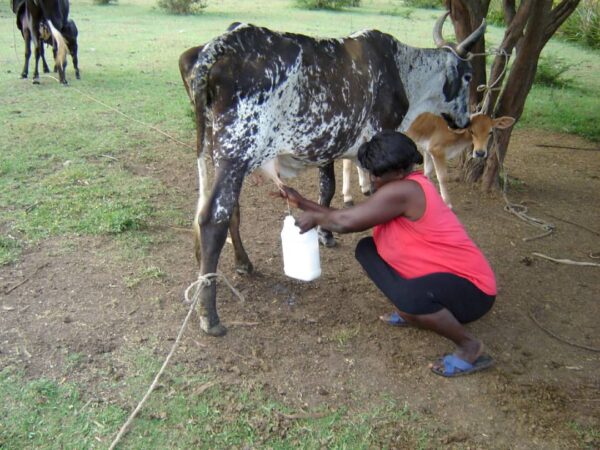
A breeder milks a cow in the town of Limonade in 2006.
In 2005, Veterimed, the structure responsible for the project, won the first prize for social innovation projects in Latin America and the Caribbean in recognition of Lèt Agogo.
This prize, presented by the United Nations Economic Commission for Latin America and the Caribbean and the W. K. Kellogg Foundation, awarded the team behind the initiative since its launch 24 years ago.
It also commended its founder, veterinarian Michel Chancy, for his civic commitment and enthusiasm.
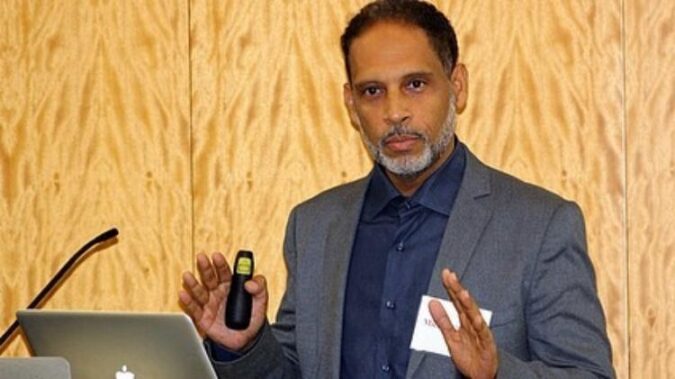
Michel Chancy in Atlanta, USA in 2019. | © UniQ
Despite insecurity and the deep economic crisis, the former minister of animal husbandry is banking on his country.
“Leaving is not an option,” Chancy insists, his features open and his temples graying.
The project was born after years of exile in the Canadian cold.
Chancy’s father, Max, and mother, Adelina Magloire, had to flee the country in the 1960s.
Trade unionists, his parents wanted to preserve the democratic gains under threat, but dictator François Duvalier had no patience for labor movements.
The jails of Fort-Dimanche systematically crushed the slightest claim to freedom of expression.
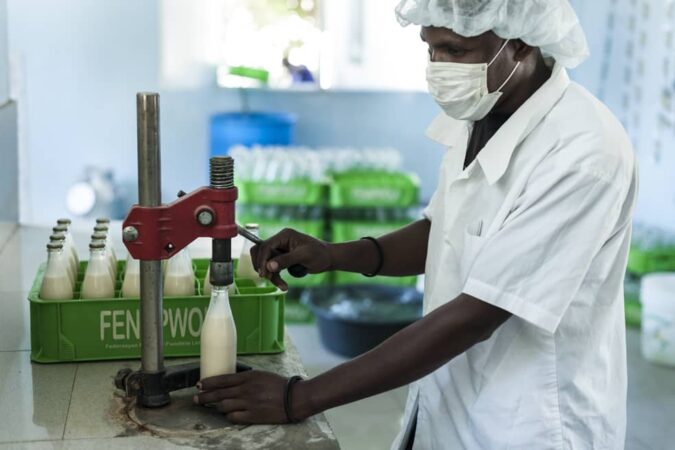
A man working on behalf of Lèt Agogo in the Damiens dairy in 2018
Max Chancy was imprisoned in 1963 for subversion.
Upon his release, the Chancy family, fearing the worst, emigrated to Canada in 1965. “I learned to love this country far from its soil,” proclaims Michel Chancy.
After Jean-Claude Duvalier was exiled on February 7, 1986, Michel Chancy decided to return to Haiti in November of the same year, following his studies in veterinary medicine and zootechnics at the National Autonomous University of Mexico.
Aged 24 on his return, the young man cured his homesickness by rediscovering “[…] the streets” of his childhood.
“I had a thirst for the country, Chancy recalls. Soon after returning, I started traveling to provincial towns to fill this lack of Haiti, with its newly rediscovered landscapes.”
Chancy’s first job in Haiti was teaching animal production and health at the École Moyenne de Développement de Hinche, in January 1987.
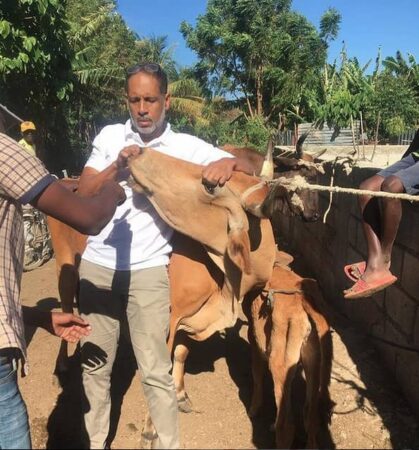
Michel Chancy at a cattle lot in Vaudreuil, Cité Soleil, in 2021.
He was troubled by the extermination of Creole pigs in the Program for the Eradication of African Swine Fever and for the Development of Pig Breeding (PEPPADEP) during the 1980s.
Consequently, he joined the Research Group for Development (GRD), made up of a group of agro-professionals concerned with peasant development in rural areas of the country, as well as the non-governmental organization CARITAS.
Between 1987 and 1989, the NGO considered a program to introduce Jamaican pigs resembling the Creole pig herd in Haiti. However, this project never saw the light of day.
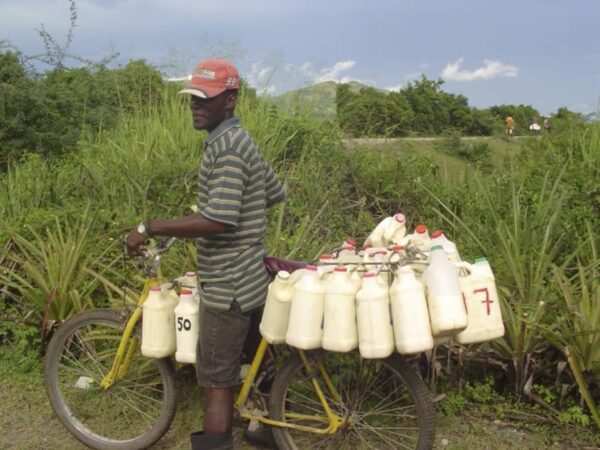
A farmer from the commune of Limonade transporting milk in 2001.
Chancy taught at the École Moyenne de Développement de Hinche until 1988.
He was dismissed by Henry Namphy’s National Council of Government (CNG) due to a strike against the autonomy of Haitian universities, which was deemed to be in danger.
Since then, the question of breeding became central for Chancy. “Livestock breeding is very important in the national economy,” he analyzes. “And I have always said to myself that peasant organizations should be better trained to solve the problems they face.”
To meet these training needs he founded Veterimed in 1991. The non-governmental organization, made up of young agronomists specializing in animal health and production along with a few veterinary nurses, aims to train veterinary agents in the entire country.
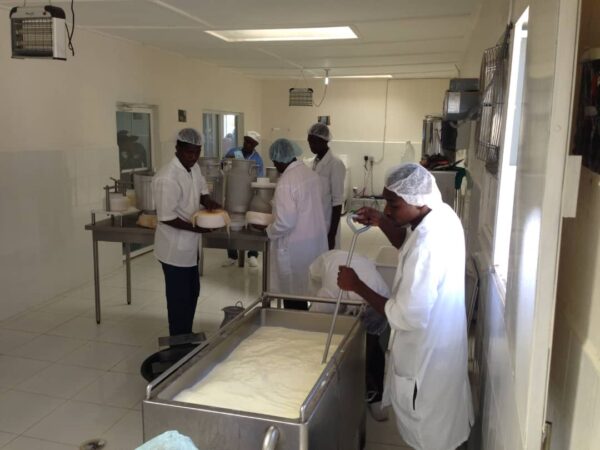
A day of work in the Thomazeau dairy in 2017.
In 1991, under the presidency of Jean-Bertrand Aristide, Michel Chancy became Director of Animal Health at the Ministry of Agriculture, Natural Resources and Rural Development (MARNDR). There, he continued to focus on the wide-scale training of veterinary agents.
The entrepreneur held this post for approximately five months, until the coup d’état against the priest-president on September 30, 1991. « Between 1991 and 2000, we trained more than 1,000 agents in all of the communal sections of the country, » he underscores.
In 2000, Veterimed founded the brand « Lèt Agogo » (Milk Agogo).
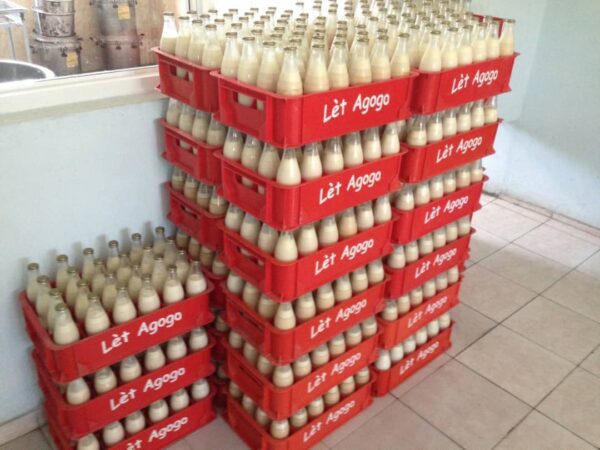
Crates of sterilized milk bottles in the Maïssade dairy in the Central Plateau in 2018. | © Veterimed
The initiative emerged in a context where market liberalization in the 1980s disadvantaged the national dairy sector in favor of imports, and where processing plants had been closed between 1995 and 2005.
Since then, Chancy has received numerous international awards, including that of “Humanitarian Leader” for Latin America and the Caribbean, at the 12th edition of the “Latin Trade Bravo Business Awards” in 2006.
Despite the accolades, Lèt Agogo does not have it easy. Customs fees deemed “exorbitant” by Chancy do not favor national production.
Insecurity is also a challenge.
Of the 35 dairies within “Lèt Agogo,” 21 are still operating today. Several dairies in parts of the metro area are “hard to access or controlled by gangs.”
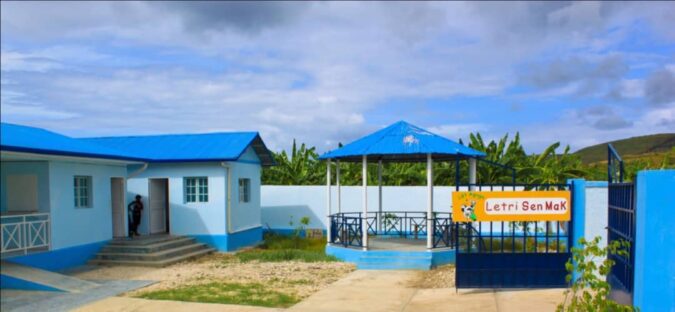
View of the Lèt Agogo dairy in the commune of Saint-Marc, in Artibonite. | © Veterimed
Most of these dairies are managed and supervised by “young people.” Some are former interns or students of Michel Chancy at the Faculty of Agronomy and Veterinary Medicine (FAMV).
For example, Zacharie Fanfan, a former student from the 2014-2019 FAMV cohort, supervises the Saut-Mathurine dairy, in the south. The initiative, he told AyiboPost, allowed him to gain “maturity, professionally.”
In 2023, a load of Lèt Agogo leaving the Arcahaie dairy was sequestered for ransom and emptied in Canaan by heavily armed bandits, according to Chancy.
Financially, the institution is trying to stay afloat.
Lèt Agogo provides sterilized milk to 90 schools across the country thanks to a partnership forged in September 2023 with the Ministry of National Education and Vocational Training (MENFP) with support from the French Embassy in Haiti.
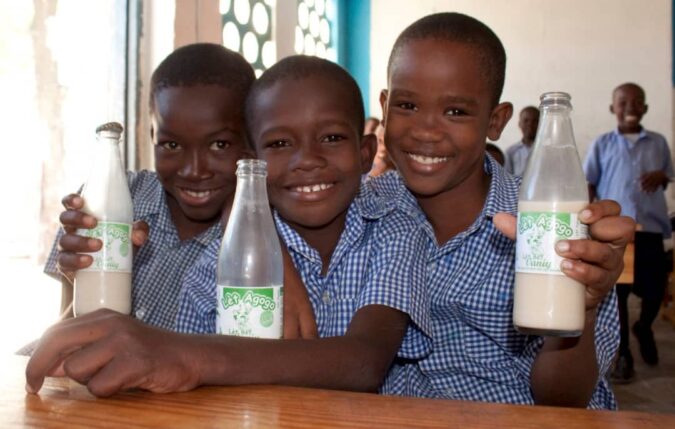
Schoolchildren from the Lèt Agogo/MENFP partnership program posing with a bottle of sterilized milk.
This agreement allows the company to keep its head above water “although the contractual conditions have become unfavorable due to the fluctuations in inflation.”
The insecurity has affected the entrepreneur personally. Five members of his family have experienced the horrors of kidnapping, four of them in the last three years.
But his “Haitian dream” keeps him standing and accompanies him every day. » I am wired and educated for Haiti, he says. And I persist for this country, to feel useful.”
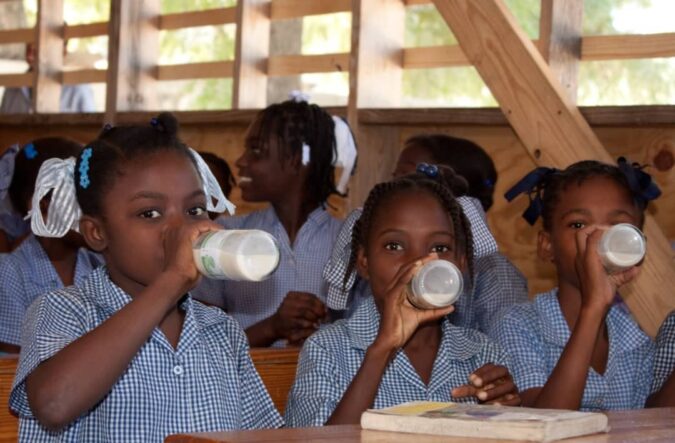
Schoolgirls from the Lèt Agogo/MENFP partnership program posing with a bottle of sterilized milk.
In Haiti, the annual consumption of milk is 130,000 tons, with 45,000 tons produced locally. Potential production is 145,000 tons, but 100,000 tons of milk is wasted every year due to a lack of adequate skills and infrastructure, according to an Oxfam report.
For Michel Chancy – head of the animal health and production programs at Quisqueya University ‘s Faculty of Agricultural and Environmental Sciences – the « Haitian struggle » stems in part from an economic imbalance.
« And self-fulfillment, continues the professor, cannot be envisaged without a collective economic and social lifeline. »
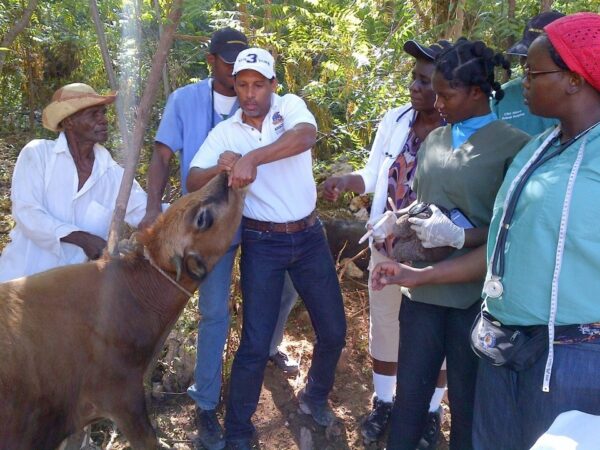
Michel Chancy at Île de la Gonave in 2014.
This article has been updated to clarify the involvement of organizations in dairies. 11.14 5.6.2024
Cover image : A breeder from the town of Limonade milks a cow in 2005.
Keep in touch with AyiboPost via:
► Our channel Telegram : Click here
► Our Channel WhatsApp : Click here
► Our Community WhatsApp : Click here







Comments